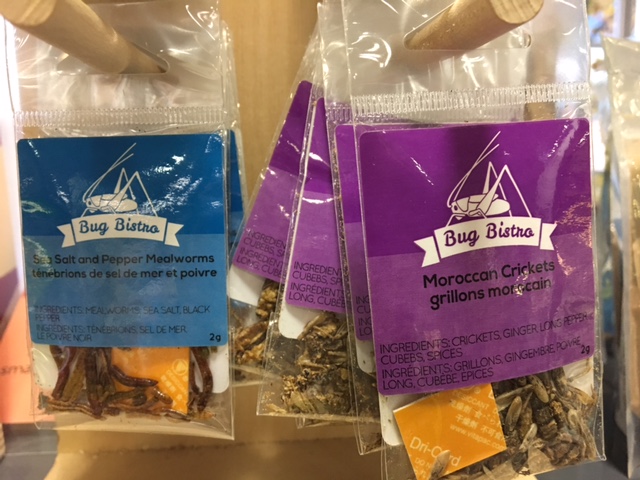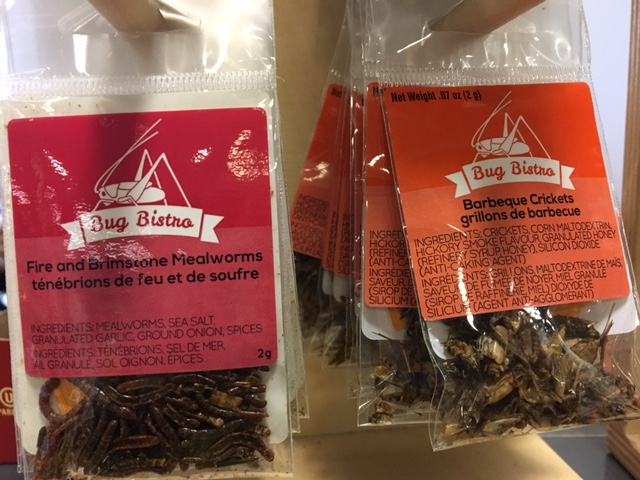The coming year’s food scene will — for the most part — bring healthier goodies to the table, industry insiders predict.

That means a continued trend of vegetables in a starring role on the dinner plate, with meat in the side wings.
Those who can’t give up their carnivorous ways might see more goat dishes on the menu, according to the 2017 culinary forecast by Sterling-Rice Group, a marketing agency for food manufacturers. Goat meat is supposed to be low in calories, fat, and cholesterol; it’s also sustainable to raise. So it should appeal to the increasingly environmentally-conscious and health-minded consumer.
Sardines, meanwhile, could replace avocados as the trendy toast topping. The canned food staple is high in omega-3s and protein.
Here’s what else is on tap for 2017:
1. Mocktail mixology
Your mocktail is about to get more exciting.
“We’re not talking Sprite and lime or Shirley temples here, folks,” restaurant enthusiast Jerry Aulenbach wrote on Facebook after three rounds of impressive “virgin froufrou drinks” at The Black Pearl in Edmonton.
“For our first round, we asked them to make something that tasted like Christmas. When I glanced over to see what [the bartender] was up to, I saw him holding a blowtorch up to a stick of cinnamon.”
Bar manager Leland Morrison explains that to do a mocktail justice, you can’t simply take out the alcohol from a recipe and expect it to taste good.
“A virgin mojito, for instance, really starts to fall apart without the rum,” he said.
So they’ll play with the ratios of other ingredients to come up with a concoction that’s equal parts delicious and alcohol-free.
WATCH: How to mix classic mocktails

After noticing more people ask for them in the past couple months, Morrison is working on a full winter mocktail menu.
That’s what Sterling-Rice is also seeing at a number of other restaurants: “From non-alcoholic happy hours to standalone mocktail menus, beverages are being positioned as unique experiences that can be had without the hangover.”
2. Insects
Need a little extra protein? Crickets and mealworms are coming to a store shelf near you.
You can already find both hanging by the till at celebrity chef Mark McEwan’s market in Toronto’s Shops at Don Mills. The “bug bistro” buffet includes Moroccan, Barbeque and Honey Mustard Crickets, as well as Sea Salt and Pepper or Fire and Brimstone Mealworms.
Roasted crickets or mealworms can be sprinkled on salad like croutons, he added.

Get breaking National news
There’s also cricket powder, which can be used in smoothies, a salad dressing, or in baking.
WATCH: The co-owner of Vij’s restaurant in Vancouver talks about putting crickets on the menu for the first time last year
Fun fact: crickets require 12 times less feed and 13 times less water than cattle to produce the same amount of edible protein, and not nearly as much farmable land.
READ MORE: Eating insects: From fringe fad to the future of food
The practice of eating insects, aka entomophagy, is not a new phenomenon. The United Nations estimates people in 80 per cent of the world’s countries eat bugs.
3. Plant butchers
Vegetables are in vogue — literally.
Vogue published a piece this year on “plant butchers,” described in the magazine as artisans who “create and shape plant proteins into forms that often resemble, both in look and texture, burgers, sausages, hot dogs, and more.”
At Yam Chops, a vegetarian butcher in Toronto, customers can find everything from beet burgers to coconut bacon.
The new breed of butcher shops caters to vegans, vegetarians, and meat lovers alike.
4. Plant-based water
The popularity of coconut water has spilled over into a plant-based water craze.
We now have everything from watermelon water (plugged by Beyonce this year), cactus water (which makers say contains electrolytes and antioxidants), aloe water (which is supposed to aid digestion and weight loss), and even artichoke water (which is apparently better than it sounds and is loaded with vitamins).
Jill Holroyd, the senior vice president of Restaurants Canada, predicts there will be a stronger interest in Canadian sources like maple water and birch water in 2017.
“You’ll see birch water out there used as an ingredient or on its own or mixed with another beverage,” she said.
Whatever health claims these drinks make, though, many health experts believe nothing beats good old H20 — which can be found in your tap.
5. Poke
Could poke (pronounced ‘po-kay’) be the next sushi?
“Poke is popping up on a lot of new menus now,” said Holroyd. “It’s fresh and nutritious and flavourful.”
For those not familiar with the Polynesian dish, it’s a raw fish salad which can be served in a plethora of ways.
https://www.instagram.com/p/BM4hmG-gmvy/
It’s often marinated with lime, soy, and sesame and often served with rie.
The Guardian believes it will be “next year’s must-have snack.”
6. Cake for breakfast?
Now this is a trend we can get behind (and may have already been indulging in for years).
“There was a study that recently came out from Syracuse University re-touting the benefits of dark chocolate, specifically on cognitive function — abstract reasoning, memory, focus,” Liz Moskow, the culinary director at Sterling-Rice, told Food Business News.
“The thought was eating chocolate prepares you more for your workday, so what better day part to incorporate dark chocolate into your meal than breakfast?”
You had us at chocolate.
7. More delivery services
As we all seem to get busier, getting food couriered to our doorstep will continue to become even easier.
Hungry Torontonians already have a bunch of options to choose from in that department: UberEats, Foodora, Favour, and Ritual, just to name a few.
There’s also a smorgasborg of services across the country, including Fresh Prep in Vancouver, that deliver fresh and local ingredients for gourmet recipes that can be cooked in less than 30 minutes.
READ MORE: 5 meal subscription services that will make your life easier
All the ingredients needed to make the dish, including spices, are portioned out and chopped. Fresh Prep’s meals are prepared by local chefs and approved by nutritionists.
“The food delivery technology that’s available now is exposing consumers to more choices and options than ever before,” said Holroyd.
“It makes it very easy to try something new and different.”
— With files from Andrew Russell and Negar Mojtahedi, Global News and The Canadian Press
























Comments